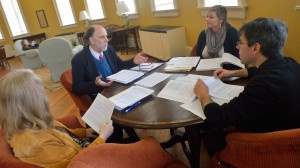
Recipients of the inaugural faculty seed grants discuss their approaches to improving writing across the disciplines.
OXFORD, Miss. – The University of Mississippi Center for Writing and Rhetoric has awarded $26,750 to four faculty members to improve writing campus-wide.
These first-ever grants were awarded on a competitive basis to those who designed writing-intensive modifications to existing courses, and who plan to implement those changes beginning this academic year. The Faculty Seed Grant program is the final phase of the Quality Enhancement Plan that began in 2009.
Recipients of the Faculty Seed Grants are Gerard Buskes, professor of mathematics; Joshua First, Croft assistant professor of history and international studies; Robert Mongue, associate professor of legal studies; and Kristen Alley Swain, assistant professor of journalism. Awardees have begun meeting weekly in a seminar format with Angela Green, the center’s writing-enriched curriculum instructor, to plan their courses and improve writing pedagogy.
“We have offered the Faculty Seed Grants in order to improve student writing across campus and in all disciplines, rather than just in the first- and second-year writing classes we teach in the CWR,” Green said.
Faculty members receive the $5,000 stipend to compensate them for the additional time spent developing and implementing writing-related activities. At the end of the grant period, results will be presented in a public forum.
Buskes will revise Math 261-Unified Calculus & Analytic Geometry I to fully integrate writing into the course. Students will be required to use writing to reflect on the mathematics they use in class and explain their understanding of key course concepts.
First will redevelop History 347-Topics on Film and History to allow students to gradually acquire advanced skills in preparation for their capstone experiences.
Mongue will rewrite one of the paralegal program’s required law courses, LA 308-Wills and Estate Administration, to focus on writing as a means of communicating students’ understanding of the substantive law for that class and to provide a template for the revision of most of the program’s legal courses.
Swain proposed creating an explanatory writing module, consisting of active-learning exercises and assignments, for use in three sequential core journalism courses. The courses are JOUR 102-Introduction to Multimedia Writing, JOUR 271-News Reporting and JOUR 377-Advanced Reporting.
“One of the things I’ve enjoyed about working here is the ability to take advantage of opportunities to work with experts in many different fields in order to improve my own teaching and writing,” Mongue said. “Writing is an essential part of the curriculum for legal professionals. For many legal professionals, their final product is a written document, whether it be a letter to a client, legal memoranda, pleadings, appellate briefs or documents such as deeds, wills or business documents. Each must be written clearly, concisely and with precision.
“The primary benefit we expect students in these classes will receive is a better understanding of how writing and research differs across disciplines,” Green said. “For example, students in history should learn the specific conventions that historians use in their writing, as well as the types of questions historians ask, what evidence they use and how they conduct research.”
The Center for Writing and Rhetoric will offer grants again for the 2014-2015 academic year. These will be selected on a competitive basis and require the endorsement of the faculty member’s department chair. Grants are open to all full-time faculty, both in and out of the tenure stream. Interested faculty members should contact Angela Green at akgreen2@olemiss.edu.